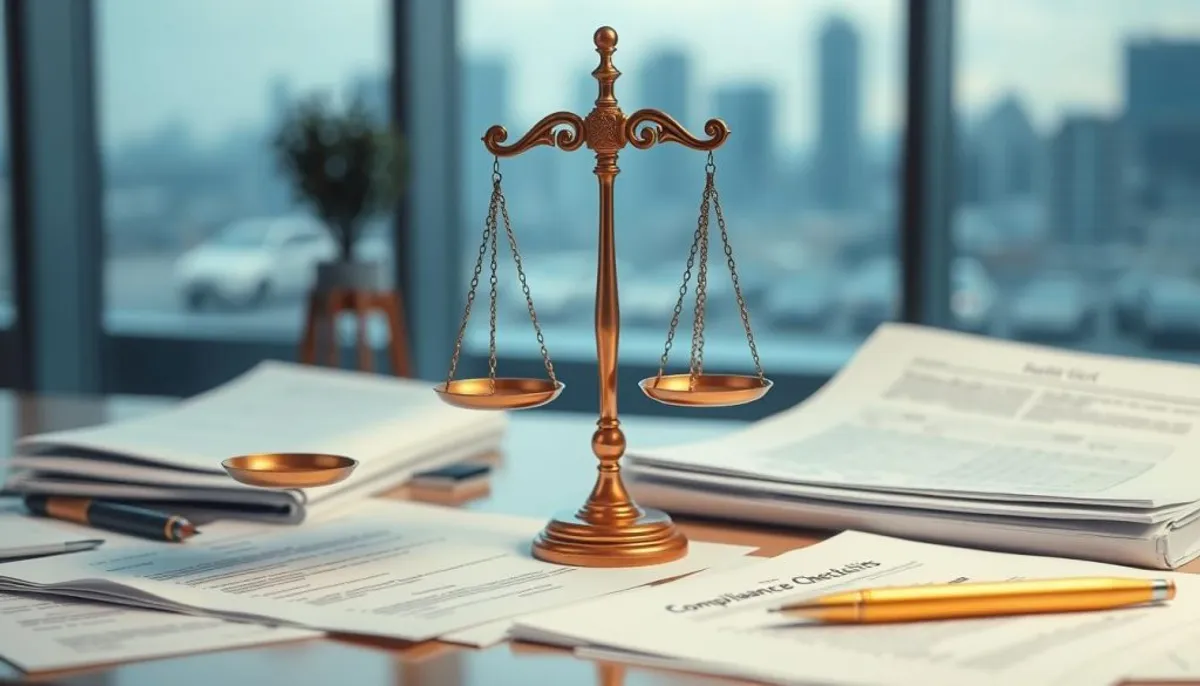Managing unpaid debts can be a significant challenge for businesses. Debt collection agencies offer a solution by recovering outstanding payments, ensuring companies maintain a healthy cash flow. But, selecting the appropriate agency for your needs can be daunting.
This guide will navigate you through the process of hiring a debt collector. We will discuss the essentials of collection agency services, evaluating their credentials, and ensuring compliance. By the end, you will be well-informed to make a decision that enhances your financial health.

Debt collection agencies operate on a contingency basis, meaning you only pay when they successfully recover funds. This model is cost-effective, aligning the agency’s interests with yours. Agencies employ advanced tools and technologies, often surpassing in-house collection efforts in recovery rates.
When choosing a collection agency, industry experience is paramount. Opt for an agency that understands the specific challenges of your sector. Such expertise can significantly enhance your debt recovery success.
Key Takeaways
- Debt collectors are crucial for maintaining financial stability
- Choose agencies with relevant industry experience
- Contingency-based fees offer cost-effective solutions
- Advanced tools boost debt recovery success rates
- Licensing and insurance requirements vary by state
- Regular communication with the agency is essential
- Monitor agency performance to track progress
Understanding Debt Collection Services
Debt collection services are pivotal in managing accounts receivable. These experts focus on retrieving funds from accounts that have not been paid, ensuring businesses maintain a steady cash flow.
What is Professional Debt Collection
Professional debt collection involves third-party agencies working on behalf of creditors to recover outstanding debts. They employ various strategies, including phone calls and letters, to pursue delinquent accounts. The Fair Debt Collection Practices Act governs these activities, ensuring they are conducted ethically.
Types of Debt Collection Services
Debt collection agencies provide a range of services to meet different needs:
- Early-stage collections
- Late-stage bad debt recovery
- Legal action for severely delinquent accounts
- Skip tracing to locate debtors
Benefits of Professional Debt Recovery
Engaging professional debt collectors offers several key benefits:
| Benefit | Description |
|---|---|
| Improved Cash Flow | Faster recovery of outstanding debts |
| Specialized Expertise | Knowledge of effective collection strategies |
| Legal Compliance | Adherence to FDCPA and state regulations |
| Time and Resource Savings | Allows businesses to focus on core operations |
Professional debt collection services are instrumental in enhancing a company’s accounts receivable management. They ensure timely bad debt recovery, thus maintaining financial stability.
How to Hire a Debt Collector
Choosing the right debt collector is crucial for successful commercial debt recovery. Third-party debt collectors can be invaluable partners in reclaiming unpaid funds. The process requires careful consideration of several key factors.
Evaluating Collection Agency Credentials
When selecting a debt collection agency, start by examining their credentials. Look for memberships in professional organizations like The Association of Credit and Collections Professionals (ACA). These affiliations often indicate a commitment to industry standards and best practices.
Checking Licensing and Insurance
Verify that the agency is properly licensed and insured. Most states require collection agencies to be licensed, ensuring compliance with legal requirements. Ask for proof of Errors & Omissions (E&O) insurance, which protects your business in case of mistakes during the collection process.
Assessing Industry Experience
Experience matters in debt collection. Some agencies specialize in collecting from larger businesses, while others excel at recovering debts from smaller enterprises. Choose an agency with a track record in your industry for better results. For example, MetCredit, a Canadian collection agency, has maintained an A+ rating with the Better Business Bureau since 1974, demonstrating long-standing expertise.
Remember, collection agencies typically work on a percentage basis, taking a cut of the recovered amount. Fees can vary based on the debt type and size, so discuss fee structures upfront. By carefully evaluating these factors, you’ll be better equipped to choose a debt collector that aligns with your commercial debt recovery needs.
Essential Qualifications and Skills for Debt Collectors
Effective debt collectors are pivotal in the realm of debt recovery. They must possess a blend of qualifications and skills to thrive. While a high school diploma is often the minimum requirement, knowledge of debt collection best practices and regulations is invaluable.
Key qualifications include:
- Understanding of FDCPA and HIPAA regulations
- Familiarity with various collection methods
- Basic computer skills
- Customer service experience
Essential skills for successful debt collectors encompass:
- Strong communication abilities
- Negotiation expertise
- Patience and persistence
- Critical thinking
- Assertiveness balanced with politeness
Debt collectors must navigate challenging situations, such as handling customers using offensive language or addressing common debtor excuses. They need to employ various debt collection strategies, from phone calls to in-person visits. Skip tracing skills are valuable for locating hard-to-find individuals.
Job satisfaction and motivation are crucial in this role, as collectors often work with targets and face rejection. The ability to maintain professionalism while pursuing debt recovery is key to long-term success in the field.
Legal Requirements and Compliance
Debt collection agencies face a myriad of legal hurdles to maintain compliance. The Fair Debt Collection Practices Act (FDCPA) is paramount, dictating strict conduct for collectors. It serves as the foundation for legal adherence in debt collection.
Fair Debt Collection Practices Act (FDCPA)
The FDCPA safeguards consumers from abusive collection tactics. It confines contact times to 8 a.m. to 9 p.m., bars workplace calls, and prohibits aggressive behavior. Collectors must dispatch a written validation notice within five days of first contact. This notice must outline the debt’s specifics and the creditor’s identity.

State-Specific Regulations
States also impose their own rules on debt collection, complementing federal laws. These regulations may extend consumer protections or address gaps in the FDCPA. Agencies must grasp both federal and state laws to sidestep legal entanglements.
Industry Certifications
Professional certifications underscore a dedication to ethical conduct. For medical debts, HIPAA certification is essential. Other certifications highlight a firm’s proficiency and commitment to industry standards. They bolster credibility and ensure adherence to debt collection laws.
| Requirement | Description |
|---|---|
| Contact Hours | 8 a.m. to 9 p.m. |
| Validation Notice | Within 5 days of initial contact |
| Workplace Contact | Restricted if known to be inconvenient |
Collection Agency Fee Structures
Understanding debt collection fees is crucial when hiring a collection agency. The fee structure can significantly impact your bottom line and the effectiveness of the debt recovery process.
Contingency Fee Models
Contingency-based collection is the most common pricing model. Agencies charge a percentage of the recovered debt. Fees typically range from 15% to 50%, depending on factors like debt age and amount.
| Claim Amount | Contingency Rate |
|---|---|
| Under $1,000 | 50% |
| $1,000 – $5,000 | 25% |
| $5,000 – $50,000 | 20% |
| $50,000 – $500,000 | 15% |
| Over $500,000 | 10% |
Flat Rate Services
Some agencies offer flat rate services, charging a fixed fee per account regardless of the debt size. Prices can start from $15 per account, making it predictable for businesses with numerous small debts.
Debt Purchase Options
In this model, the agency buys the debt outright at a reduced cost. While this guarantees immediate payment, the amount received is typically lower than other collection methods.
When choosing a fee structure, consider your business needs, cash flow expectations, and the age of the debts. Remember, the agency’s success rate often matters more than the fee structure itself.
Technology and Tools in Modern Debt Collection
The debt collection industry is witnessing a significant transformation. The integration of debt collection software and automated processes is revolutionizing operations. These innovations enhance efficiency and success rates in debt recovery.
Advanced software solutions enable agencies to track debts, communicate with debtors, and generate reports seamlessly. Platforms like FICO and Collect! streamline operations, allowing collectors to manage multiple accounts efficiently.
Automated reminders have proven highly effective in reducing late payments. By sending personalized notifications before and after due dates, agencies can prompt timely responses from debtors. This approach minimizes the need for manual follow-ups and improves overall collection rates.
AI-driven analytics play a crucial role in modern debt collection. These tools predict payment patterns and identify high-risk accounts, allowing agencies to prioritize their efforts effectively. By leveraging customer segmentation and predictive models, collectors can tailor their strategies for optimal results.
Digital payment platforms have gained popularity among debtors. They offer convenience, immediate confirmation, and enhanced security. By integrating these platforms, agencies can facilitate quicker debt settlements and improve customer satisfaction.
| Technology | Impact on Debt Collection |
|---|---|
| Automated Reminders | Reduces late payments by 30% |
| AI-Driven Analytics | Improves recovery rates by 25% |
| Digital Payment Platforms | Speeds up settlements by 40% |
| Cloud-Based Solutions | Reduces operational costs by 20% |
Cloud-based debt collection solutions offer scalability and remote access. These features allow agencies to manage collections from anywhere, reducing costs and enabling real-time updates. The flexibility of cloud solutions is invaluable in today’s dynamic business environment.
Evaluating Collection Agency Success Rates
When selecting a collection agency, it’s essential to understand debt recovery success rates. Agencies like Summit Account Resolution achieve recovery rates of 34.8%, with some cases reaching as high as 80%. Prestige Services Inc. (PSI) boasts a 38% recovery rate, exceeding the industry average of 20-25%.
Recovery Rate Metrics
Collection agency performance varies significantly, with recovery rates spanning from 7% to 25%. These rates directly influence the amount businesses can recover from past-due accounts. Rocket Receivable, for instance, claims to recover debt at four times the industry average, highlighting the potential of top-performing agencies.
Industry Benchmarks
Typically, businesses refer accounts to collection agencies when they are 90 to 120 days past due. Professional agencies charge fees ranging from 12% to 40% of the recovered amount. For example, IC System’s Premier Collect Plan charges a 25% fee on collections.
| Agency | Recovery Rate | Industry Average |
|---|---|---|
| Summit Account Resolution | 34.8% | 20-25% |
| Prestige Services Inc. | 38% | 20-25% |
| Rocket Receivable | 4x industry average | 20-25% |
Performance Tracking Methods
To effectively evaluate collection agency success rates, businesses should request detailed reports on collections, phone calls, and account activities. Some agencies provide real-time dashboards for tracking performance. Advanced technologies, such as smart outreach and collections automation, enhance efficiency in debt recovery.
By comparing an agency’s performance to industry benchmarks and utilizing comprehensive tracking methods, businesses can make informed decisions when selecting a collection partner. This approach maximizes debt recovery efforts.
Communication and Reporting Protocols
Effective debt collection reporting and client communication are pivotal for successful partnerships with collection agencies. Establishing clear protocols fosters transparency and enables better oversight of the collection process.
When engaging a debt collector, define specific communication preferences. Specify the update frequency and format you expect. This ensures a continuous flow of information throughout the recovery journey.

Comprehensive reports are indispensable in debt collection. They should outline collection efforts, interactions with debtors, and financial outcomes. Request frequent updates on recovery rates and the strategies used.
| Communication Aspect | Best Practice |
|---|---|
| Contact Hours | 8 a.m. to 9 p.m. only |
| Workplace Contact | Prohibited if notified |
| Contact Frequency | Max 7 times in 7 days |
| Validation Information | Within 5 days of initial contact |
| Debt Dispute | Cease collection until verified |
It’s crucial to remember that debt collectors must adhere to strict communication guidelines. They cannot engage in harassment, make false statements, or treat debtors unfairly. Ensuring your chosen agency respects these standards is essential for ethical debt recovery and fostering positive client relationships.
Introducing ti3 as a Modern Collection Solution
In the realm of automated debt collection, ti3 emerges as a leading-edge SaaS debt management platform. It revolutionizes the handling of overdue accounts, merging efficiency with client relationship management. This innovative solution stands out in the industry.
Automated Payment Reminders
ti3 employs automation to streamline the collection process. It sends timely, personalized reminders to debtors. This approach increases the likelihood of prompt payments, all while preserving client relationships.
Streamlined Collection Process
ti3 optimizes the debt recovery workflow. It automates issue escalation and payment collection, minimizing manual intervention. This results in enhanced efficiency. Businesses can then focus on their core activities, leaving debt management complexities to ti3.
Client Relationship Management
Unlike traditional methods, ti3 emphasizes maintaining positive client relationships. Its approach is less intrusive and more cooperative. This fosters better communication between businesses and their customers.
| Feature | Benefit |
|---|---|
| Automated Reminders | Increased payment likelihood |
| Streamlined Workflow | Reduced manual intervention |
| Relationship-focused Approach | Improved client retention |
| Cost-effective Solution | Lower operational expenses |
Adopting ti3 can significantly enhance a business’s debt collection processes. This SaaS debt management solution offers a balanced approach. It combines automated debt collection techniques with a focus on preserving valuable client relationships.
Industry-Specific Collection Strategies
Specialized debt collection necessitates a profound comprehension of industry-specific recovery tactics. Each sector confronts distinct hurdles in managing unpaid debts. For example, the healthcare industry struggles with substantial outstanding balances, a result of high-cost services. Medical debt collection demands navigating intricate regulations and patient privacy concerns.
The finance sector, on the other hand, deals with high-value transactions and stringent regulations. It encompasses unpaid loans, credit card balances, and insurance premiums. Construction debts often arise from project disputes, involving mechanic’s liens. Retail businesses face numerous small debts from credit purchases and failed payment plans.
Effective debt recovery strategies vary by industry:
- Healthcare: Focus on patient communication and HIPAA compliance
- Finance: Utilize data analytics for risk assessment
- Construction: Understand lien laws and contract disputes
- Retail: Implement large-scale, automated collection processes
- Technology: Address rapid changes in licensing and service agreements
Hiring a collection agency with industry-specific experience can significantly enhance recovery rates. These agencies grasp sector nuances and best practices, ensuring adherence to professional standards throughout the collection process.
Risk Management and Insurance Requirements
Effective debt collection risk management is crucial for protecting your business. When hiring a collection agency, it’s essential to verify their insurance coverage and risk assessment protocols. This ensures both legal compliance and financial security in your debt recovery efforts.
Errors and Omissions Coverage
Collection agency insurance should include Errors and Omissions (E&O) coverage. This protects your business from potential legal issues arising from mistakes in the collection process. E&O insurance safeguards against claims of negligence or inadequate work performance.
Liability Protection
Liability insurance is another critical component of debt collection risk management. It shields your company from lawsuits related to debt collection activities. When evaluating agencies, ask about their liability coverage limits and what specific risks are included.
Risk Assessment Protocols
A reputable collection agency should have robust risk assessment protocols in place. These procedures help identify and mitigate potential liabilities before they become issues. Ask about their quality control measures and how they stay up-to-date with collection legislation.
| Insurance Type | Purpose | Importance |
|---|---|---|
| Errors and Omissions | Protects against mistakes in collection process | High |
| Liability Insurance | Covers lawsuits related to collection activities | High |
| Cyber Liability | Protects against data breaches | Medium |
Remember, a well-insured agency with strong risk management practices provides added security and professionalism to your debt recovery efforts. Always verify an agency’s licensing and insurance before engaging their services.
Conclusion
Choosing the right collection agency is paramount for effective debt collection. With 82% of businesses failing due to cash flow issues, partnering with a professional debt collector can be a game-changer. Collection agencies outperform small businesses in debt recovery, thanks to their specialized training and advanced techniques.
When hiring a debt collector, it’s important to consider their fee structure. This often includes fixed fees or contingency-based payments. While the costs may seem high, the benefits of professional debt recovery often outweigh the expenses. These agencies handle large volumes of cases efficiently, employing skip tracing and other tactics to locate elusive debtors.
Effective debt collection is not merely about recovering money. It’s also about maintaining professional relationships and adhering to legal standards. Many agencies offer additional services like premium audits and have in-house legal teams to guide decisions. By entrusting your debt collection to experts, you can focus on your core business activities while ensuring a healthy cash flow.
RelatedRelated articles



